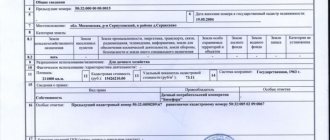The assessment is performed by experts with >5 years of experience . We have all current qualification certificates in areas (real estate, movable property, business)
We always meet project deadlines . It is important for us to show results in a short time
The price includes free support for Reports (corrections, elimination of comments)
the most polite employees communicate with you .
We bring complex projects to fruition . People turn to us in situations where other experts have failed
Regulating real estate turnover in Russia is an equation with many unknowns. Suffice it to recall the wording “unfinished construction project” or the division of a land plot and a building built on it into separate objects. We are the only ones on the planet who operate with these concepts.
Law, practice, controversy
Why is the turnover of Russian real estate from the standpoint of the law so illogical and frivolous when viewed through the eyes of the average person?
The answer is obvious: the purpose of registering real estate in Russia is not order in the register, but tax interest: the more owners there are in the system, the more taxes they pay.
Cadastral registration
real estate in Russia is a private business. Accordingly, the level of provision of professional services in a niche depends on the terms of the contract, or more precisely, the “agreement”. Hence the huge number of errors and unreliable data in the registry.
Time gap
(from days to months) between the contract and registration is another “slippery” area. Who is the owner of the property at this time? According to Art. 551 of the Civil Code of the Russian Federation, the alienator is the owner until the registration of the new owner. Meanwhile, the joint resolution of the Plenums of the Supreme Court and the Supreme Arbitration Court of the Russian Federation No. 10/22 explains that already at this stage the legal owner is the buyer, and the seller, if he remains the owner of the property, is only a nominal one, without the right to dispose of it.
Or investment lease
, which experts believe is a legalized corruption scheme. If the principle of lease is the return of the item of use at the end of the contract, then how to resolve the issue with a building erected on leased land? The typical solution is to extend the lease, but there is no need to explain how we resolve renewal issues, especially if state land is involved in the case.
All these details negatively affect the commercial turnover of real estate in Russia, leveling the progress of world law and giving a unique national flavor to the relations of society with the local executive and legislative authorities.
Separate agreement for a special product
Real estate transactions exist as a separate type of purchase and sale agreements. This selection is not accidental, because the commodity – real estate – is unstable and changeable here. In addition, every time the legislative branch introduces a new object into the list, it does not take into account its specifics and does not offer additional explanation and regulation.
Current rules:
- purchase and sale of buildings and structures are regulated by § 7 of Chapter 30 of the Civil Code of the Russian Federation;
- transactions with land plots – Art. 37 Land Code of the Russian Federation.
Practice of application of rules
First requirement
– the form of a real estate transaction cannot be simple written, but only strict. According to Art. 550 of the Civil Code of the Russian Federation, the agreement is concluded as a single document with the autographs of the parties. Any other option - letters, telegrams - is excluded. The consequences are non-recognition of the transaction.
Second requirement
– mandatory state registration of a real estate purchase and sale agreement.
Current rules of paragraph 2 of Art. 551 of the Civil Code of the Russian Federation states that compliance by the seller and buyer with the terms of the contract before its registration does not constitute the basis for new relations between the parties with third parties regarding the property. But paragraph 3 of the same article 551 prescribes: if the seller avoids state registration, thereby delaying the transfer of ownership to the buyer, the court has the right to make a decision on forced registration.
How a seller can conclude an agreement on real estate transactions - step-by-step instructions for beginners
If you are a seller, then everything is somewhat simpler. After all, you are sure that your property is legally clear and there are no prohibitions on transactions with it. However, in order for everything to go smoothly, you need to double-check that your property has not been seized because of your debt.
Please note that the presence of minor children may be an obstacle to selling your home. To prevent this from happening, you need to prepare for the deal in advance. How to do this - read on.
Step 1. Prepare the apartment and documents for its sale
The apartment needs to be put in order. If you are leaving some pieces of furniture to the new owners, then discuss this in advance, or better yet, make a list and attach it to the transfer deed. Collect all documents necessary for the sale.
What the seller needs to check and do:
- the validity of your passport and the passports of co-owners of the property, if any;
- availability of ownership documents or extracts from the Unified State Register of Real Estate;
- absence of arrests and other restrictions on sales;
- request permission from the guardianship authorities for the transaction (if there are minors);
- obtain permission from your spouse for the transaction from a notary;
- if the property was in shared ownership, agree with the notary on the date of signing the purchase and sale agreement.
Some buyers, to guarantee their safety and avoid challenging a real estate transaction, require a certificate from the PND (psychoneurological dispensary). Therefore, it’s worth getting it too, but it’s better before the transaction itself. If there is a misunderstanding between you and close relatives regarding a real estate transaction, then a sanity examination is even more necessary.
Step 2. Looking for a buyer
When everything is ready, we begin searching for a buyer. There are two options: either you place advertisements in newspapers and websites yourself, or you turn to a real estate company for help. However, you can combine these two methods.
The advertisement itself must describe in detail the technical characteristics of the object, the condition of the surrounding area, and infrastructure. It is advisable to do this in an artistic form - this attracts a potential buyer.
Step 3. Draw up a preliminary purchase and sale agreement
When a buyer is found, discuss all the conditions with him and draw up a preliminary purchase and sale agreement. You can do this yourself or contact any law firm that provides such services. The cost of this is low, but you will save time.
Step 4. Control the placement of money in the safe deposit box
If you have agreed that the buyer will transfer the money through a safe deposit box, then go to the depository with him and control the deposit of the money. Count the bills carefully to avoid mistakes. The buyer gives the key either immediately or after registration of the property.
Step 5. We conclude a purchase and sale agreement and register the rights of the new owner
After depositing the money, go with the buyer to the MFC or Rosreestr, sign the agreement and submit the documents for registration. Please note that real estate transactions are subject to taxes, which are called state duties. The payment receipt must be attached to the package of documents.
Now all that remains is to wait until Rosreestr registers the rights of the new owner. The deadlines are established by law and cannot be violated. Most often, registration is completed in 5-9 days, depending on the type of object and the place where documents are submitted.
Step 6. Get money
After the new owner receives the documents, make a copy of them and go to the bank for money. Don't forget to take with you the canceled documents that confirm the termination of your right.
Land plot and buildings on it
The issue of transferring rights to a land plot to the buyer of buildings and structures located on it is very relevant today. This practice is regulated by Art. 552 of the Civil Code of the Russian Federation and the document contains both a general provision and solutions for individual cases.
For example, the seller is the owner of both the plot and the real estate on it. The actual rule here is:
- under the contract of sale
, the owner transfers to the buyer of real estate the rights to the land occupied by this real estate or necessary for its full use.
This norm has been used since the summer of 2007. Prior to this, the rules allowed the parties to independently determine the period during which the buyer became the owner of the land plot. There was also a general presumption:
- if the parties did not reach a common opinion
regarding the timing and procedure for transferring the land plot, then this right was granted to the seller “automatically”, along with the right of ownership of the building.
However, for judicial practice, the issue was purely technical. The new owner is interested in having the right to the property transferred to him along with the right to part of the land plot under the building, which means that he is the buyer and has to fuss with the land management authorities on issues of surveying and boundaries.
Today this process looks different. First, the owner forms a plot of land regarding the building and only after that enters into a purchase and sale agreement, according to which he (the seller) transfers ownership of the land and the building to the buyer.
Types of real estate transactions. Types of transactions and operations performed with real estate
Real estate transactions are relationships between individuals and (or) legal entities, which result in the emergence, change or termination of any property rights and obligations. The result of a real estate transaction should be a change, emergence or termination of any property obligations and rights. The basis for carrying out any operations with real estate is the conclusion of an agreement on the expression of the will of an individual or legal entity, aimed at achieving a particular goal.
Real estate transactions are currently one of the most sought after, but at the same time one of the most complex areas of law. Without proper experience and relevant knowledge in this area, it is quite difficult to navigate independently.
All real estate transactions performed are strictly regulated by the legislation of the Russian Federation . Each operation has its own clear definition and structure for its implementation. All actions performed with real estate are regulated by the Civil Code of the Russian Federation and the Federal Law “On registration of rights to real estate and transactions with it.”
Today, there are unilateral and bilateral types of real estate transactions . Unilateral transactions include those in which only one party participates in the conclusion of the transaction. The most illustrative example of such a transaction can be considered the procedure for the will of real estate by one legal entity.
All other, most frequently performed real estate transactions fall into the category of bilateral transactions. The most commonly used options for real estate transactions are: purchase and sale of real estate, leasing it to another person, the procedure of donation, as well as rent and exchange. Types of real estate transactions. Types of transactions and operations performed with real estate
The validity of a real estate transaction is determined through the combination of the following conditions: – legality of the content; – legal capacity and capacity of individuals and legal entities entering into a transaction; – compliance with the will and expression of the parties to the transaction; – compliance with the form of the transaction.
When dealing with real estate, the most commonly used basis for concluding transactions is an agreement (donation, sale, etc.). In most cases, to conclude such an agreement, a free written form of the agreement is required (a notarized agreement is required only in one case - when registering an annuity).
All transactions made in the real estate market are subject to mandatory state registration (exceptions in this case are short-term lease agreements concluded between several individuals without notarization). Registration of transactions is carried out in the Office of Rosreestr (Federal Registration Service (FRS, SBR).
Main types of real estate transactions:
Donation
According to the terms of this transaction, the real estate of one party transferred free of charge A distinctive feature of this type of transaction is the absence of payment, including money or any services. Until the state right to real estate is registered, the donor has the opportunity, according to the terms of the agreement, to revoke his donation.
Rent
According to the terms of the lease agreement, real estate is transferred by one person to another person for use with the receipt of certain benefits for this (monetary compensation or additional services). In some cases, the agreement allows for the drawing up of a lease agreement on a free basis, but then it will be a free use agreement.
Exchange
Exchange - carried out between the tenant (owner) and the tenant, fixed by an exchange agreement. Exchange - exchange of property for property (exchange agreements - have the same rules for drafting and state registration as for a purchase-sale transaction).
Purchase and sale
According to the terms of the purchase and sale agreement, the seller undertakes the obligation to transfer ownership of the property to the buyer, and the buyer is obliged to accept this property and pay a certain price for it. It must be said that today the most popular and frequently used types of real estate transactions are: purchase and sale of housing, including in installments; purchase and sale of a land share or plot; purchase and sale of non-residential buildings, premises and structures, property complexes.
Inheritance
According to legal terminology, inheritance of property involves the transfer of property and non-property rights to private property from a deceased individual to another individual in the manner prescribed by law.
Mortgage
Housing mortgage is a special type of lending to the population. The guarantee of payment of interest and debt is the property owned by the borrower.
Privatization
Free transfer into the ownership of citizens of the Russian Federation on a voluntary basis of residential premises occupied by them in the state and municipal housing stock, including housing stock under the economic management of enterprises or the operational management of institutions (departmental fund).
There are also such types of real estate transactions as:
- economic management and operational management - ownership, use and disposal of state or municipal property; — trust (trust management) – transfer of property for a certain period of time with the obligation to manage this property in the interests of the beneficiary; — leasing – acquisition of property with subsequent lease; — pledge – the use of property as security for obligations; — contribution to the authorized capital, or as a share. — insurance – the obligation for the insurance premium upon the occurrence of an insured event to compensate the beneficiary for losses within the limits of the insured amount;
False real estate transactions are transactions in which the subject of the agreement is preliminary (partial or full) payment for the property being created: - purchase and sale of housing under construction; — contract for the construction of the facility; — purchase and sale of a non-individualized plot of land; — lending to the developer.
We have listed all the main types of real estate transactions, however, in each type of transaction there are many nuances that need to be paid attention to in each transaction.
If you require competent and inexpensive implementation or support of real estate transactions in the Balashikha district of the Moscow region - +7-495-941-62-10
Important terms and conditions of real estate transactions
When considering the features of real estate transactions, you should focus on two significant points: the subject and price of the contract.
Subject of the agreement
Until 2011, the practice of applying Art. 554 of the Civil Code of the Russian Federation looked like this: the agreement contained parameters that set the individuality of not only the real estate being sold, but also the plot under it. If the building did not have a specific address, a mandatory annex to the contract was required with a site plan and an indication of the object located on it, certified by land management organizations. Otherwise, the contract was recognized as not concluded.
Everything changed in 2011 with the resolution of the Plenum of the Supreme Arbitration Court of the Russian Federation No. 54. The document said that if the individual characteristics of the property are not indicated in the agreement, but they are present in the transfer and acceptance certificate, then such an agreement is considered concluded.
Contract price
In this context, the contract price (Article 555 of the Civil Code of the Russian Federation), as a norm, is needed in order to exclude the use of Art. 485 of the Civil Code of the Russian Federation, which has a reference to clause 3 of Art. 424 of the Civil Code of the Russian Federation, since according to general provisions, a purchase and sale agreement can be concluded even without indicating the price of real estate.
Article 485 of the Civil Code of the Russian Federation states that in such circumstances, paragraph 3 of Art. 424 Civil Code of the Russian Federation:
- if the contract does not indicate a price, then the monetary obligation is fulfilled on the basis of prices for similar goods or services under similar circumstances.
But it would be a mistake to allow this rule to apply to a real estate transaction.
As a result: the price must be indicated in the purchase and sale agreement, or it is considered invalid.
How a buyer can enter into a contract for real estate transactions - 5 main steps
Each party to the transaction must follow its own algorithm throughout the entire operation. However, some requirements are the same. For example, both the seller and the buyer must strictly comply with the law. Otherwise, the real estate transaction is declared invalid by a court decision.
In addition, you need to know that if fraud is detected during the registration process, either party can initiate the procedure for terminating the purchase and sale agreement. Read about how this happens in practice in the feature article on our portal. Now let's look at the algorithm for concluding a deal for the buyer.
Stage 1. Choosing an apartment
Today, most buyers browse many ad sites in the hope of finding a suitable home or other property.
They publish both private advertisements and objects from the real estate agency database. You have the right to choose your own apartment or seek help from such an agency.
Example
Several years ago I purchased a room in a communal apartment for my student son. At first I had to go around many options, but nothing was good. The housing was either “killed” or with neighbors who were alcoholics and drug addicts.
After that, I entered into an agreement with one of the well-known real estate firms. I came across a very responsible employee. The guy found me a room within a week, and also “talked” the owner into giving up almost 150 thousand rubles.
Contacting the company is preferable if you are concerned about the purity of a real estate transaction. After all, all objects in the database are checked, since the agency is responsible to the client.
Stage 2. Conclusion of a preliminary purchase and sale agreement
There may be several options here. The simplest case: you download a sample contract from the Internet and edit it to suit your details. Please note that this is only allowed in a simple transaction where there is one seller and one buyer.
It is more difficult when several people owned the property. In this case, you will not be able to draw up an agreement yourself. Transactions with real estate in shared ownership take place in front of a notary. He draws up an agreement and prints it out on a special form.
Stage 3. Selecting a bank for the transaction
If you decide to pay the seller through a safe deposit box or letter of credit, then you need to take care of choosing a suitable bank. The fact is that not all branches have depositories, especially not every bank provides letter of credit services. Therefore, inquire in advance about the availability of such an opportunity in the department where you are used to being served.
Stage 4. Conclusion of an agreement and transfer of money
When you find a suitable bank, you can proceed to the final signing of the purchase and sale agreement. Once again, carefully re-read it so that there are no errors or typos in the text and especially in the details of the parties to the agreement.
In the agreement with the bank for renting a safe deposit box and in the additional agreement, clearly state the conditions for transferring money to the seller. The same applies to the option with a letter of credit. The purchase and sale agreement is signed directly when submitting documents for registration of a real estate transaction in the MFC or Rosreestr.
Stage 5. Completion of settlements for the transaction and signing of the transfer deed
The essence of the deed of transfer is that the parties have made all payments between themselves and have no claims against each other. When using a safe deposit box, letter of credit or deposit with a notary, this means that the money is transferred for temporary storage, and the seller will receive it after the transaction is registered in the Unified State Register of Real Estate.
The signed transfer deed is attached to the package of documents necessary for the procedure for registering ownership of a house or any other real estate. Before signing this document, the buyer should once again make sure that the information contained in it is correct.
Cadastral value based on the price of the object
The basis of the price in the purchase and sale agreement is, of course, the cadastral value. Up-to-date information related to the explanation of the concept of cadastral value should be found in Resolution of the Plenum of the Armed Forces of the Russian Federation No. 28.
The general category “Disputes over cadastral value” is divided in this document into three separate groups:
- on bringing the cadastral value to parity with the market price of real estate;
- about changes in the cadastral value based on the results of an incorrect assessment of the property;
- challenging decisions of the commission on cadastral value issues.
Of particular interest in this resolution is paragraph 25, which states that any consideration of a dispute over the cadastral value must end for the court with a resolution on the new value of the object with mandatory entry into the cadastre.
About the rules for executing the contract
In a real estate transaction, the contract is executed, the process is recorded and confirmed by a document on the acceptance and transfer of property. Requirement for registration: strict written form of a single sample with signatures of the parties.
Key points of certain types of transactions
Each transaction in the real estate market has its own characteristics. It is regulated by separate norms of civil and housing legislation and has its limitations. The main types of transactions in the real estate market at present are privatization, purchase and sale, and rent.
Privatization of residential premises
Privatization is the free transfer of premises intended for residence and owned by the municipality and the state into the ownership of citizens.
Deal Features:
- All participants have the right to free privatization only once.
- The privatization agreement is concluded without fail, regardless of the will of the officials who sign all documents on the transfer of the apartment.
- It is possible for minors with limited legal capacity to participate in the transaction.
Documents required for the transaction:
- statement;
- certificate from the municipal inventory bureau on the composition of the residential premises;
- extracts from the house book, indicating the composition of residents;
- personal passports of all participants in the transaction;
- consent of the bodies exercising control over observance of the rights of citizens with limited legal capacity;
- documents that confirm the applicant’s possible rights to privatized housing (for example, use agreements, decisions of the owner).
Residential purchase and sale transaction
This type of transaction is one of the most common. A residential purchase and sale agreement is the main type of transaction in the secondary real estate market.
Deal Features:
- When persons who have the right to use live in the residential premises, the rights of the new owner are limited.
- The agreement comes into force after its state registration.
- The price of the object of the transaction is an important condition; if it is not included in the contract, it is considered not concluded.
Documents required for the transaction:
- documents that confirm the rights of an individual to real estate. (these are various agreements, decisions of judicial authorities, decisions of municipal authorities, certificates of inheritance by law, wills and others);
- an extract from the house book, indicating the composition of the residents;
- personal passports of all participants in the transaction;
- a certificate confirming that there are no debts on utility bills;
- documents that indicate the absence of debts on property taxes;
- certificates confirming the seller’s legal capacity;
- consent of the bodies exercising control over observance of the rights of citizens with limited legal capacity;
- the consent of the spouse drawn up by a notary;
- documents according to which all shared owners waive the preemptive right to acquire a share in the apartment;
- power of attorney.
Transactions of purchase and sale of non-residential premises
Recently, the sale of non-residential real estate has become the main type of commercial real estate transactions. They are regulated by civil law.
Key points of this type of transaction in the primary non-residential real estate market:
- After signing an agreement for the sale of non-residential real estate, the transfer of the object is carried out according to the acceptance certificate.
- The subject of the agreement, in addition to the property itself, is a land plot (part thereof).
- A graphic representation (plan) of the property must be attached to the contract, indicating clear boundaries.
Lease transactions for non-residential premises
Under this agreement, part of the property is transferred into temporary possession for a certain period.
The contract must indicate:
- exact characteristics of the premises (address, area);
- the condition of the leased object at the time of transfer;
- movable property being leased (furniture, communications equipment, etc.) and its condition;
- rent amount;
- details of the tenant and landlord;
- a description of the condition of all engineering systems in the rented premises at the time of transfer of the premises;
- payment procedure;
- the amount of the penalty that the tenant must pay in case of late payment;
- contract time;
- procedure for payment of possible material damage;
- procedure for resolving disputes between the parties;
- procedure for terminating the contract.
Real estate is a specific product. Transactions with it have many features. Before signing contracts, you need to carefully study all the nuances and it is better to contact experienced realtors.
Disputes about future real estate
The question of the legal basis for transactions with real estate that does not exist at the time of the contract - future real estate - remains relevant.
There are two positions.
First
– classify such transactions as contracts of a special type, since they do not fit into the usual system of contracts provided for by the Civil Code of the Russian Federation. This is either a “participation agreement in shared construction” or an investment contract, the meaning of which is that the investor pays the developer, and he builds a future structure on his own site, but for the counterparty.
If we evaluate this transaction as an investment contract, then the provisions of RSFSR Law No. 1488-1, which is still in force, and Federal Law No. 39 are applicable here. From these laws it follows that the investor has the rights to own, use, and dispose of the object from the moment the investment begins. This also means that the one who constructs the object is not its owner.
Second position
– consider this type of contract as an ordinary purchase and sale. To potential objections that the seller, not being the owner of the property, has no right to act as a party to the contract, there is a counter argument:
- The Civil Code of the Russian Federation does not require that when concluding a transaction, the seller has the right of ownership of the alienated real estate (clause 2 of Article 455 of the Civil Code of the Russian Federation). An excellent example is the widespread practice of pre-selling furniture or cars.
Therefore, if we consider the relationship between the investor and the developer as a regular purchase and sale agreement, the solution here may be as follows: real estate, which is being built with the investor’s funds, is the property of the seller, and only after the object has been put into operation and the developer has registered the rights to it, he transfers to their buyer.
By and large, the legal background of the transactions described does not bother the parties to the transaction in simple situations when the obligations of the contract are fulfilled in full and on time. It finds practical significance in extraordinary circumstances, especially if third parties are involved in the scheme.
Let's look at an example
The investor paid the developer for the future property. He used these funds to build a building on his site, registered ownership (legally), but did not give the property to the investor. What will the buyer's claim be based on?
If we take investment legislation as a basis, then the claim will be based on property rights
. In court, such cases are called “on the recognition of the investor’s ownership rights to the results of investment activities.”
If the buyer’s argument is the fact that the developer promised to give up the property, the claim is based on the rules of the law of obligations
and is based on Art. 398 Civil Code of the Russian Federation.
But the situation with non-transfer of a property becomes most acute when there is more than one investor in the case and the building is not completed.
In the case of the proprietary concept, the unfinished property belongs to investors on the basis of shared ownership. The law of obligations considers unfinished property to be the property of the developer. In such a situation, claims must be filed for termination of the transaction and return of money, payment of penalties and losses.
Which way to solve the problem is correct if the situation is complicated, for example, by the bankruptcy of the developer? Investors obviously benefit from the property approach. However, there is a nuance here: paragraph 4 of Resolution No. 54 of the Plenum of the Supreme Court of the Russian Federation states that there is no investment property, but the property of the developer, and therefore, in case of bankruptcy, the unfinished property is included in the bankruptcy estate.
On the other hand, the Supreme Court of the Russian Federation believes that real estate investors are share owners of an unfinished property. And more than once the civil collegium recognized the share of ownership in unfinished buildings as belonging to investors.
Today, the legislator is choosing in favor of the obligation concept, the basic rules of which can be learned from Federal Law No. 214. The document calls for the legal pledge to be considered the key point in protecting the rights of shareholders, thus recognizing that if the building was built at the expense of the shareholder, then it belongs to him.
And if the developer is declared bankrupt, then the investors’ money is considered secured by collateral and the claims of such creditors are satisfied first.
Requirements for real estate transactions, as for any other civil law transactions, relate to the subject matter of the transaction, its form and content.
As a general rule, the parties to the contract must have legal capacity and capacity (Articles 17, 21 of the Civil Code of the Russian Federation). The person disposing of the real estate must have the appropriate authority to complete the transaction. A person’s lack of authority to enter into a transaction may be grounds for declaring the transaction invalid (Articles 168, 174 of the Civil Code). According to paragraph 3 of Art. 1 of the Civil Code of the Russian Federation, when establishing, exercising and protecting civil rights and when performing civil duties, participants in civil legal relations must act in good faith. No one has the right to take advantage of their illegal or dishonest behavior (Clause 4, Article 1 of the Civil Code of the Russian Federation). By virtue of the first paragraph of clause 1 of Art. 10 of the Civil Code of the Russian Federation does not allow the exercise of civil rights solely with the intention of causing harm to another person, actions in circumvention of the law for an unlawful purpose, as well as other deliberately dishonest exercise of civil rights (abuse of law). In order for the purchaser of real estate to be recognized as a bona fide purchaser within the meaning of Art. 302 of the Civil Code of the Russian Federation, he needs to verify that the seller has the right to alienate real estate. A bona fide purchaser is one who did not know and should not have known that the seller did not have the right to alienate real estate, since he was not the owner of the property. Transactions, the object of which is real estate, are concluded in simple written form by drawing up one document signed by the parties (Articles 160, 434, 550 of the Civil Code). The following transactions are subject to mandatory notarization: - alienation of shares in the right of common ownership of real estate, including the alienation by all participants of shared ownership of their shares in one transaction, with the exception of transactions related to property constituting a mutual investment fund or acquired for inclusion in composition of a mutual investment fund, transactions for the alienation of land shares, transactions for the alienation and acquisition of shares in the right of common ownership of real estate when concluding an agreement providing for the transfer of ownership of residential premises in accordance with the Law of the Russian Federation of April 15, 1993 N 4802-1 “On the status of the capital of the Russian Federation” (except for the case provided for in part nineteen of Article 7.3 of the said Law) (clause 1 of Article 42 of Law No. 218-FZ); - related to the disposal of real estate under guardianship conditions, as well as transactions for the alienation of real estate belonging to a minor citizen or a citizen recognized as having limited legal capacity, are subject to notarization (Clause 2 of Article 54 of Law No. 218-FZ). By agreement, the parties may provide for mandatory notarization of a transaction, even if this form was not required by law for transactions of this type (subclause 2, clause 2, article 163 of the Civil Code). For a number of real estate transactions, the law also establishes a requirement for their mandatory state registration. According to paragraph 3 of Art. 433 of the Civil Code of the Russian Federation, an agreement subject to state registration is considered concluded for third parties from the moment of its registration, unless otherwise provided by law. Agreements that are subject to registration include: a lease agreement for a building or structure for a period of more than one year (Article 651 of the Civil Code of the Russian Federation), an enterprise lease agreement (Article 658 of the Civil Code of the Russian Federation), an agreement for participation in shared construction (clause 3 of Article 4 Federal Law of December 30, 2004 N 214-FZ “On participation in shared construction of apartment buildings and other real estate and on amendments to certain legislative acts of the Russian Federation”). It should also be noted that by virtue of paragraph 1 of Art. 131 of the Civil Code of the Russian Federation, ownership and other real rights to immovable things, restrictions on these rights, their emergence, transfer and termination are subject to state registration in the Unified State Register by the relevant state bodies. The following are subject to registration: the right of ownership, the right of economic management, the right of operational management, the right of lifelong inheritable possession, the right of permanent use, mortgage, easements, as well as other rights in cases provided for by law. The content of the contract is the set of conditions on which the parties have reached an agreement. An essential condition of all transactions with real estate is its subject matter, which implies data that makes it possible to definitely establish the real estate to be transferred to the buyer under the contract, including data determining the location of the real estate on the corresponding land plot or as part of other real estate (Article 554 of the Civil Code RF). According to paragraph 2 of the Resolution of the Plenum of the Supreme Arbitration Court of the Russian Federation dated July 11, 2011 N 54 “On some issues of resolving disputes arising from contracts regarding real estate that will be created or acquired in the future,” to individualize the subject of the real estate purchase and sale agreement, it is enough to indicate in the cadastral agreement real estate number (if available). In the absence of this data in the contract, the condition on real estate is considered not agreed upon by the parties, and the corresponding contract is not considered concluded (Articles 432, 555 of the Civil Code of the Russian Federation). Some real estate transactions also provide for other essential conditions in addition to the subject of the contract. In particular, the contract for the purchase and sale of real estate must provide for the price of this property (Clause 1 of Article 555 of the Civil Code of the Russian Federation). However, if the parties do not agree on a condition on the price and such an agreement was executed by the parties, then it is recognized as concluded (Resolution of the Federal Antimonopoly Service of the Moscow District dated July 29, 2015 N F05-17265/2013 in case No. A41-46151/12 (Decision of the Supreme Court of the Russian Federation dated 21.10 .2015 N 305-ES15-13469 refused to transfer the case for review of this Resolution)). An essential condition of the contract for the sale and purchase of a residential building, apartment, part of a residential building or apartment in which persons live who, in accordance with the law, retain the right to use this residential premises after its acquisition by the buyer, is a list of these persons indicating their rights to use the residential premises being sold (Clause 1 of Article 558 of the Civil Code of the Russian Federation).
Cost of services
| Cost of work | ||
| Evaluation of built-in non-residential premises | 15,000 R | |
| Valuation of a detached building | from 45,000 R | |
| Valuation of garden land (individual housing construction, non-residential construction) up to 15 acres. | RUB 8,900 | |
| Assessment of agricultural land | from 18,000 R | |
| Valuation of a land plot, massif (recreational land) | Great Dane | |
| Valuation of a land plot, massif (land of settlements) | Great Dane | |
| Valuation of a dacha, garden or country house | from 10,900 R | |
Required documents
- Certificate of state registration of the right, or a purchase and sale agreement, or an Extract from the Unified State Register of Real Estate, or another document confirming the type of right to real estate;
- Lease agreement (in case of valuation of leased property, or valuation of partial rights);
- Information about existing encumbrances (collateral agreement, long-term lease);
- Technical passport for improvement;
- Floor plan;
- Explication of premises to the floor plan;
- Cadastral passport of the land plot;
- Certificate of the initial balance sheet and residual value of the object as of the date of assessment (the owner is a legal entity).
Our specialists may also need additional information: the presence of encumbrances, liens, legal disputes regarding the subject of assessment, and more. This list is not exhaustive and is ultimately determined by our specialists together with the Customer.
Main types of legal rights to real estate
There are 3 types of real estate rights, namely:
- the right to use the object of the transaction;
- right of disposal;
- ownership of the object.
In the first case, when transferring ownership rights, the following types of agreements are signed:
- equity participation in construction;
- donations;
- housing privatization;
- exchange of premises intended for living;
- transfer of real estate for payment of rent;
- purchase and sale.
During the transaction for the transfer of the right of use, the following types of agreements can be signed:
- rental of non-residential facilities;
- rental agreement for apartments in a social use fund;
- commercial rental agreement for apartments;
- easement;
- real estate pledge agreement (mortgage (see Mortgage: what you need to know));
- loan agreement (free use of property).
In the latter case, the transfer of the right of disposal is legally secured by the following types of contracts:
- economic management;
- trust.









